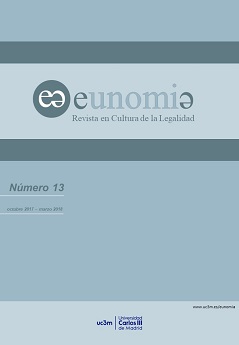The Scottish experience of devolution and secession referenda
Abstract
Consulting and engaging with the public has become vogue in recent years. The United Kingdom, without a codified constitution, has utilised the referendum to decide upon constitutional issues, with the vote to leave the European Union in June 2016 the most recent of these. This article explores the Scottish experience of referendums, examining the failed devolution referendum of 1979, the reversal of this decision in 1997, and the independence referendum of 2014, in which Scots, apparently decisively, voted to remain in the UK. This article argues that, though on each occasion political considerations rather than principle led to the use of referendums, there are lessons to be learned from each, both for proponents of direct democracy and for campaigners and activists in similar cases.
Downloads
Eunomía. Revista en Cultura de la Legalidad is a duly registered journal, with EISSN 2253-6655.
The articles published in Eunomía are –unless indicated otherwise– under a Creative Commons Attribution-No Derivative Works 3.0 Spain license. You can copy, distribute and communicate them publicly as long as you cite their author and the journal and institution that publishes them and do not make derivative works with them. The full license can be consulted at: http://creativecommons.org/licenses/by-nd/3.0/es/deed.es




